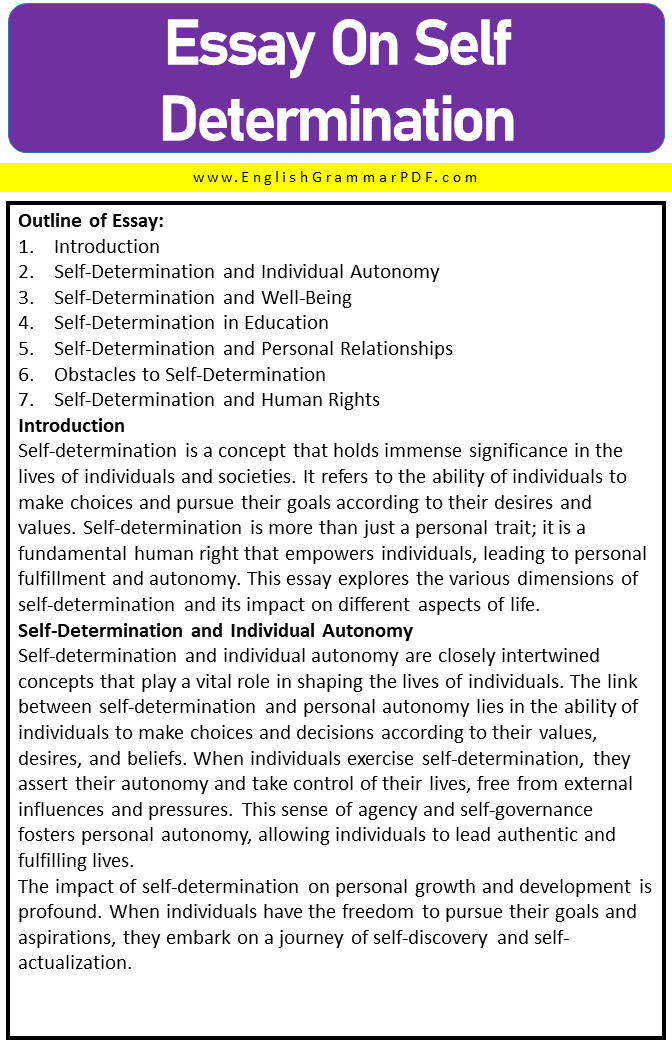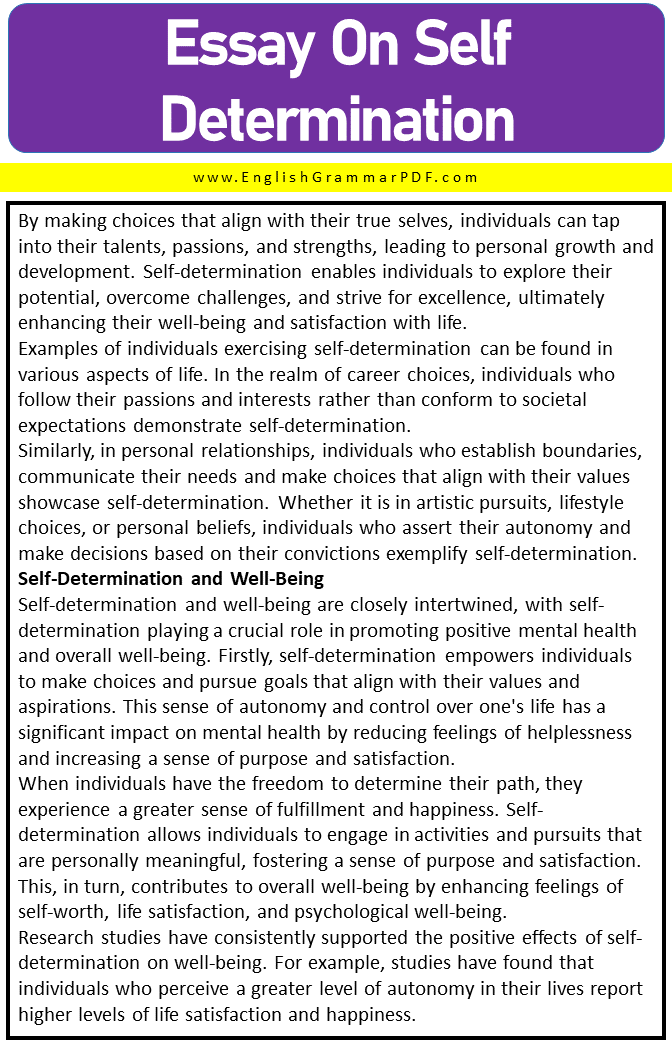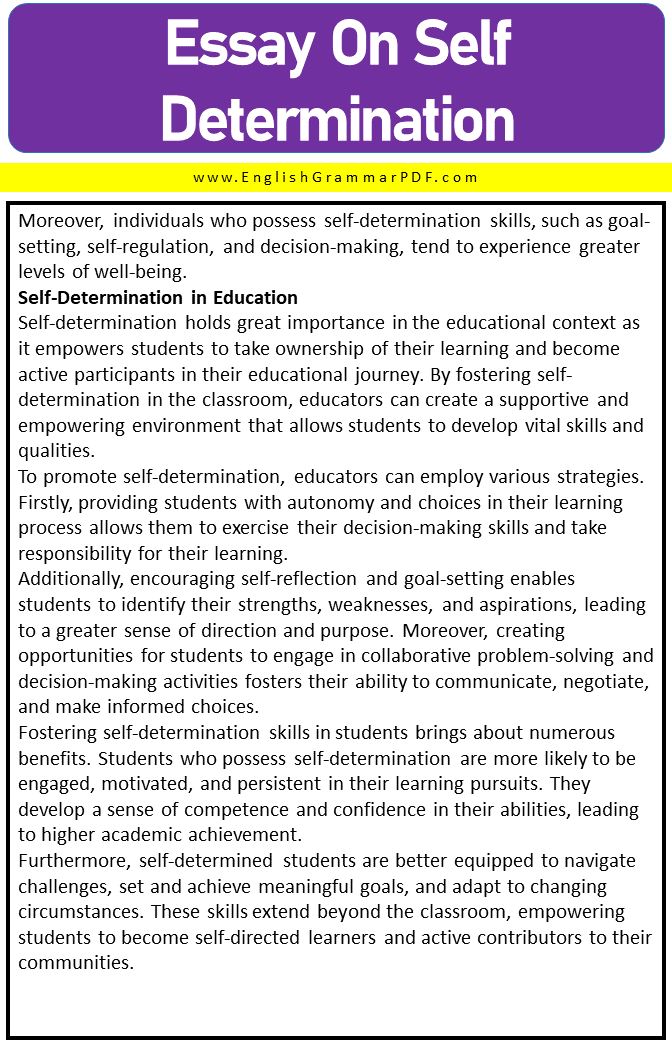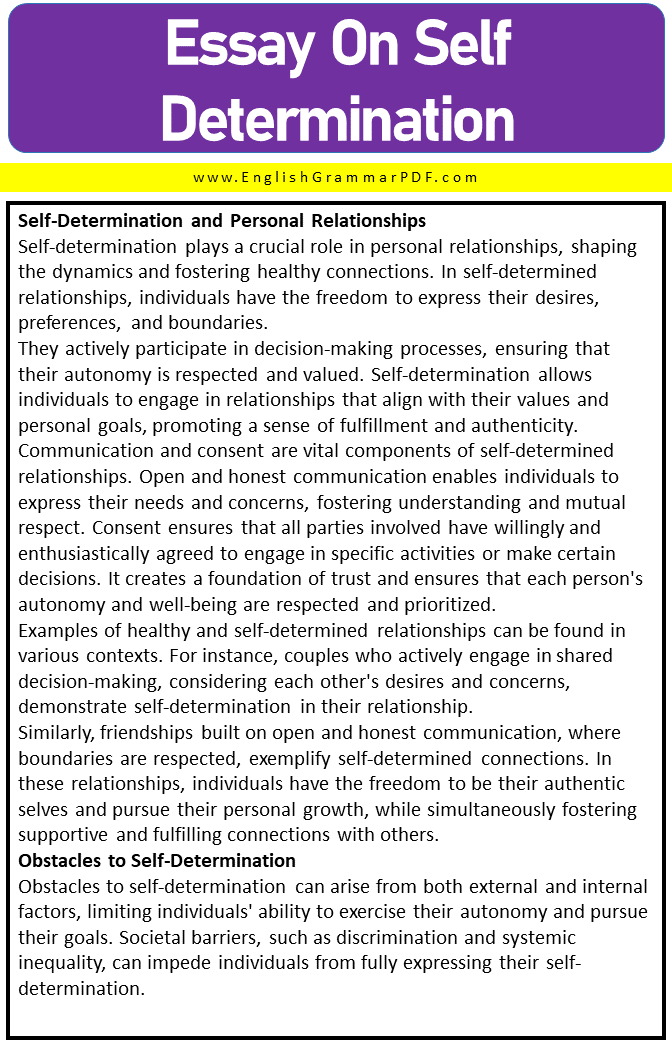Essay On Self Determination
Outline of Essay:
- Introduction
- Self-Determination and Individual Autonomy
- Self-Determination and Well-Being
- Self-Determination in Education
- Self-Determination and Personal Relationships
- Obstacles to Self-Determination
- Self-Determination and Human Rights
Introduction
Self-determination is a concept that holds immense significance in the lives of individuals and societies. It refers to the ability of individuals to make choices and pursue their goals according to their desires and values. Self-determination is more than just a personal trait; it is a fundamental human right that empowers individuals, leading to personal fulfillment and autonomy. This essay explores the various dimensions of self-determination and its impact on different aspects of life.
Self-Determination and Individual Autonomy
Self-determination and individual autonomy are closely intertwined concepts that play a vital role in shaping the lives of individuals. The link between self-determination and personal autonomy lies in the ability of individuals to make choices and decisions according to their values, desires, and beliefs. When individuals exercise self-determination, they assert their autonomy and take control of their lives, free from external influences and pressures. This sense of agency and self-governance fosters personal autonomy, allowing individuals to lead authentic and fulfilling lives.
The impact of self-determination on personal growth and development is profound. When individuals have the freedom to pursue their goals and aspirations, they embark on a journey of self-discovery and self-actualization.
By making choices that align with their true selves, individuals can tap into their talents, passions, and strengths, leading to personal growth and development. Self-determination enables individuals to explore their potential, overcome challenges, and strive for excellence, ultimately enhancing their well-being and satisfaction with life.
Examples of individuals exercising self-determination can be found in various aspects of life. In the realm of career choices, individuals who follow their passions and interests rather than conform to societal expectations demonstrate self-determination.
Similarly, in personal relationships, individuals who establish boundaries, communicate their needs and make choices that align with their values showcase self-determination. Whether it is in artistic pursuits, lifestyle choices, or personal beliefs, individuals who assert their autonomy and make decisions based on their convictions exemplify self-determination.
Self-Determination and Well-Being
Self-determination and well-being are closely intertwined, with self-determination playing a crucial role in promoting positive mental health and overall well-being. Firstly, self-determination empowers individuals to make choices and pursue goals that align with their values and aspirations. This sense of autonomy and control over one’s life has a significant impact on mental health by reducing feelings of helplessness and increasing a sense of purpose and satisfaction.
When individuals have the freedom to determine their path, they experience a greater sense of fulfillment and happiness. Self-determination allows individuals to engage in activities and pursuits that are personally meaningful, fostering a sense of purpose and satisfaction. This, in turn, contributes to overall well-being by enhancing feelings of self-worth, life satisfaction, and psychological well-being.
Research studies have consistently supported the positive effects of self-determination on well-being. For example, studies have found that individuals who perceive a greater level of autonomy in their lives report higher levels of life satisfaction and happiness. Moreover, individuals who possess self-determination skills, such as goal-setting, self-regulation, and decision-making, tend to experience greater levels of well-being.
Self-Determination in Education
Self-determination holds great importance in the educational context as it empowers students to take ownership of their learning and become active participants in their educational journey. By fostering self-determination in the classroom, educators can create a supportive and empowering environment that allows students to develop vital skills and qualities.
To promote self-determination, educators can employ various strategies. Firstly, providing students with autonomy and choices in their learning process allows them to exercise their decision-making skills and take responsibility for their learning.
Additionally, encouraging self-reflection and goal-setting enables students to identify their strengths, weaknesses, and aspirations, leading to a greater sense of direction and purpose. Moreover, creating opportunities for students to engage in collaborative problem-solving and decision-making activities fosters their ability to communicate, negotiate, and make informed choices.
Fostering self-determination skills in students brings about numerous benefits. Students who possess self-determination are more likely to be engaged, motivated, and persistent in their learning pursuits. They develop a sense of competence and confidence in their abilities, leading to higher academic achievement.
Furthermore, self-determined students are better equipped to navigate challenges, set and achieve meaningful goals, and adapt to changing circumstances. These skills extend beyond the classroom, empowering students to become self-directed learners and active contributors to their communities.
Self-Determination and Personal Relationships
Self-determination plays a crucial role in personal relationships, shaping the dynamics and fostering healthy connections. In self-determined relationships, individuals have the freedom to express their desires, preferences, and boundaries.
They actively participate in decision-making processes, ensuring that their autonomy is respected and valued. Self-determination allows individuals to engage in relationships that align with their values and personal goals, promoting a sense of fulfillment and authenticity.
Communication and consent are vital components of self-determined relationships. Open and honest communication enables individuals to express their needs and concerns, fostering understanding and mutual respect. Consent ensures that all parties involved have willingly and enthusiastically agreed to engage in specific activities or make certain decisions. It creates a foundation of trust and ensures that each person’s autonomy and well-being are respected and prioritized.
Examples of healthy and self-determined relationships can be found in various contexts. For instance, couples who actively engage in shared decision-making, considering each other’s desires and concerns, demonstrate self-determination in their relationship.
Similarly, friendships built on open and honest communication, where boundaries are respected, exemplify self-determined connections. In these relationships, individuals have the freedom to be their authentic selves and pursue their personal growth, while simultaneously fostering supportive and fulfilling connections with others.
Obstacles to Self-Determination
Obstacles to self-determination can arise from both external and internal factors, limiting individuals’ ability to exercise their autonomy and pursue their goals. Societal barriers, such as discrimination and systemic inequality, can impede individuals from fully expressing their self-determination.
Marginalized groups may face structural obstacles, including limited access to resources, unequal opportunities, and biased societal attitudes, which restrict their ability to make choices and control their own lives. These barriers create power imbalances and undermine the principles of self-determination.
Moreover, internal factors can hinder self-determination. Individuals may experience self-doubt, fear of failure, or lack of confidence, which can prevent them from embracing their autonomy and taking decisive action. Ingrained societal norms, cultural expectations, and familial pressures can also act as internal obstacles, limiting individuals’ choices and forcing them into predetermined paths.
Overcoming obstacles to self-determination requires collective efforts and systemic change. Addressing societal barriers involves dismantling discriminatory structures, promoting inclusivity, and ensuring equal access to resources and opportunities for all individuals. Additionally, fostering self-esteem, self-confidence, and resilience can help individuals overcome internal barriers and cultivate a strong sense of self-determination.
Empowering individuals to assert their autonomy and navigate through obstacles is crucial for creating a society that respects and upholds the fundamental human right of self-determination. By breaking down barriers and promoting an environment that fosters autonomy, societies can enable individuals to fulfill their potential and lead fulfilling lives based on their own choices and aspirations.
Self-Determination and Human Rights
Self-determination is recognized as a fundamental human right by international legal instruments. It is enshrined in the Universal Declaration of Human Rights and other international covenants. However, challenges and controversies surround the application of self-determination as a human right, particularly in situations where it clashes with territorial integrity and national sovereignty. Striking a balance between individual self-determination and the collective rights of communities remains an ongoing debate.
FAQ’s
What are the main principles of self-determination?
The main principles of self-determination include individual autonomy, freedom of choice, the right to pursue one’s goals, and the ability to shape one’s destiny.
How is determination important for success?
Determination is crucial for success as it provides the motivation and perseverance to overcome obstacles, stay focused on goals, and maintain resilience in the face of setbacks, leading to achieving desired outcomes.
Download the PDF of the Essay:
Explore More Essays:







